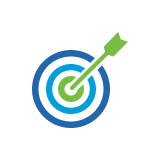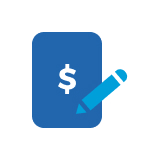Discover ways to reach your short- and long-term goals.
Set goals
Determine your short- and long-term goals
Short-term goals have timelines in-between a few months to a few years. Long-term goals may take several years or decades to fulfill.
- Short-term goals — purchasing a new bike, going on a roadtrip
- Long-term goals — buying a car, paying off any higher education or saving for a house down payment
While you work towards achieving your short- and long-term goals, ensure you know your month-by-month expenses. Let's get a closer look into all the costs you need to consider.
Consider all costs
Post-secondary education is not cheap. According to Statistics Canada, the average cost of tuition for the academic year for undergraduate students is $7,360. Considering tuition, books, residence, and food costs, you could be spending over $10,000 per year. This amount of money can be scary to think about, but a Registered Education Savings Plan (RESP) can make it a whole lot better. With an RESP, every contribution you make, the government may also make a contribution depending on 1) the student's age and 2) your family's total income.
Create a budget
Once you have a rough idea of how much money you'll need per school year, it's time to create a budget. This will ensure that your numbers are accurate and that you take out a loan of the right amount. Below are the few, simple steps to create a budget:
- Step #1 — Calculate your expenses for the upcoming school year (include tuition, books, transportation and costs of living)
- Step #2 — Determine how much money you have and expect to make during school (not everyone works during school, but if you plan to, your loan will be more affordable)
- Step #3 — Calculate the difference between the amounts in step #1 and step #2 (this will indicate the amount you'll need to borrow)
Apply for funding
As a post-secondary student, you're able to receive financial support in the form of a loan, scholarship, or grant. As a member, you are eligible to apply for a number of these financial support opportunities we help fund. A student loan is an amount of money you borrow to pay for school and pay back over time. A scholarship, bursary or award is free money a student is given to go towards school (i.e. tuition or books). Requirements for scholarships, bursaries, awards and grants differ. For example, some look at your family income, academic record, volunteer experience, your heritage and more.
Explore our scholarship opportunities >
Student loans
A student loan is a loan from the governement which helps pay for your school. These loans are meant to be paid back once the student graduates and is, assumably, working with a steady source of income. Government student loans offer the best terms.
Learn more about eligibility of government student loans >
Credit cards
If you do not qualify for a student loan, you can apply for a student credit card. In the "Open a Youth Account" section, we identify the accounts we offer specifically for students and touch on the importance of building a strong credit rating.
If you do not qualify for a government loan, another option is a student line of credit. A student line of credit helps pay for expenses related to post-secondary education. With a line of credit, you only have to pay back the money you borrow by paying it off regularly and avoiding interest fees.
Scholarships, bursaries and grants
There are various scholarships, bursaries and grants you could receive to help pay for post-secondary. This is money you do not have to pay back. It's yours to keep to go towards tuition, books, cost of living and more.
Below are links to various funding you may be eligible for.
Open a youth account
Chequing and savings accounts
Making big payments for the first time, doesn't have to be stressful. We offer accounts specifically for post-secondary students. With our youth account, you can get the best out of a chequing account and a savings account. Below are the benefits of using a chequing account and a savings account:
- Free e-transfers — making splitting food bills with your friends easier
- No-fee account — save money on everyday banking
- Access online banking at your fingertips — on our mobile and desktop app
- No-fee utility bill payments
View our Youth Account perks >
You can develop a solid credit rating when you're young. This starts with obtaining a credit card and being responsible with it from the start. A credit card offers a secure and convenient way to make your purchases and is your door to online shopping. When it is used responsibly, it can help you build a strong credit rating and be a source of emergency money during tough times.
Spend Wisely
Refer to your budget
Keep your post-secondary budget easily accessible to you, whether it is written on a piece of paper and stored safely or a document on your computer. Before making big payments, which can include rent, tuition, and books, refer to your budget. Keeping track of your spending can ensure that you don't overspend.
Write down your deadlines
Along with referring to your budget, it is helpful to always be aware of your deadlines. Paying your rent, credit card interest, and car insurance on-time can help you build good financial habits. Having these habits early on will be useful in the future!
Tools & Resources
Discover more
Get financially fit
Get into shape by building healthy habits for your financial future with our Financial Fitness Series.
Be socially responsible
Invest your money in a way that gives back. Learn how to align your investments portfolio with corporate social responsibility.
Own a car
Buying a car is a major financial investment. Learn more about your options for financing and making the right personal decision for you.
























